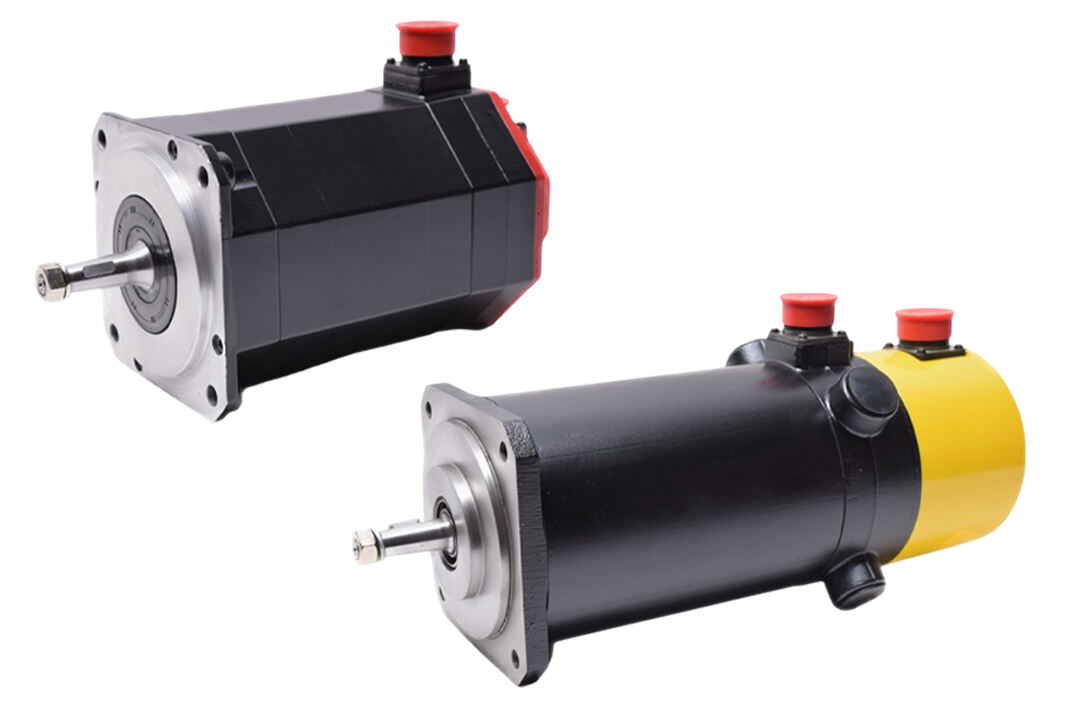Difference Between AC Servo Motor and DC Servo Motor in Fanuc
Servo motors are an important part of CNC (Computer Numerical Control) systems and robotics. As a global leader in CNC automation, Fanuc's systems rely heavily on servo motors for precise control, reliability and efficiency. In a wide range of industrial applications, these motors play a critical role in ensuring smooth operation, precise positioning and optimized performance.
Purpose of this article: To provide an in-depth look at the key differences between AC servo motors and DC servo motors, and to help users make informed decisions for their Fanuc setup.

Understanding Servo Motors in CNCs
Servomotors are specialized motors designed for high-performance motion control. They are widely used in CNC systems to regulate speed, torque, and position with high accuracy Fanuc systems rely on servomotors for precise operation in machining, robotics, and assembly tasks.
- Importance in CNC systems: Servo motors ensure smooth transitions and precise positioning, which are critical to industrial automation.
- Unique requirements in Fanuc setups: Fanuc's advanced technology requires motors to meet stringent performance standards.
What Is An AC Servomotor in A Fanuc System?
AC servo motors in Fanuc systems are driven by alternating current and are known for their high efficiency and accuracy.
- Main features: Brushless design, higher torque at high speeds, and advanced feedback systems such as encoders.
- Components: Stator, rotor and electronic control unit.
- Applications in Fanuc: Used in high-speed, high-precision applications such as robotic arms and CNC machine tools.
What Is A DC Servomotor in A Fanuc System?
DC servo motors operate with direct current and are characterized by low speed and high torque.
- Main features: Simpler structure, use of brushes and commutator, simple and clear control mechanism.
- Components: Mechanical feedback system such as armature, field winding and potentiometer.
- Applications in Fanuc: Commonly used in tasks requiring high initial torque or low-speed accuracy.
Comparison of AC and DC Servomotor Technologies in Fanuc Systems
A detailed breakdown of the technical differences between AC and DC servo motors:
- Power supply: AC motors require AC power, while DC motors use DC power.
- Control System Complexity: AC motors use advanced electronic controls, while DC motors have simpler controls.
- Performance: AC motors excel at high speeds, while DC motors are better suited for heavy-duty tasks.
- Durability and Maintenance: AC motors are brushless and more durable, while DC motors require regular maintenance.
Advantages and Limitations of AC Servomotors in Fanuc Systems
Advantages:
- High-speed capability with precise positioning.
- Energy-efficient operation reduces long-term costs.
- Brushless design ensures durability and minimizes maintenance requirements.
- Ideal for applications requiring fast motion and accuracy.
Limitations:
- High initial cost due to complex technology.
- Complex control systems may require specialized personnel for setup and maintenance.
- Not the best choice for low-speed, high-torque applications.
Advantages and Limitations of DC Servomotors in Fanuc Systems
Advantages:
- Excellent low-speed torque makes them ideal for heavy-duty applications.
- Simple construction and low initial cost.
- Simple control system makes it easier to integrate into older Fanuc setups.
- Ideal for retrofit or cost-sensitive projects.
Limitations:
- High maintenance requirements due to brushes and commutator.
- Shorter service life in harsh environments compared to AC motors.
- Reduced efficiency and reliability at high speeds.
Common Applications of AC Servomotors in Fanuc Systems
AC servomotors are the backbone of many advanced Fanuc applications:
- Robotics: High-speed robotic arms for assembly and material handling.
- Machining: CNC milling and turning centers requiring accuracy and repeatability.
- Automation: Packaging, sorting and pick-and-place tasks on production lines.
Common Applications of DC Servo Motors in Fanuc Systems
DC servo motors are still important in some special applications:
- Heavy machinery: Tasks requiring high starting torque.
- Retrofits: Upgrading older Fanuc systems with cost-effective solutions.
- Customized applications: Special setups where low speed torque is critical.
Conclusion: Find the Right Motor for Your Fanuc System!
Choosing an AC servo motor or a DC servo motor depends on the specific needs of your application.
AC servomotors provide advanced performance for modern high-speed Fanuc systems.
DC servo motors are suitable for applications with lower speed requirements and limited budgets.
Songwei has extensive expertise in this area, so contact us for expert advice on selecting, maintaining and optimizing servo motors for your Fanuc system.



